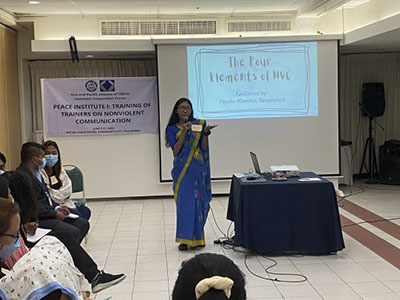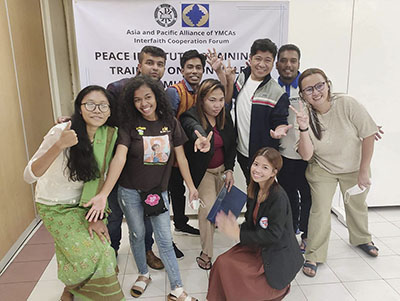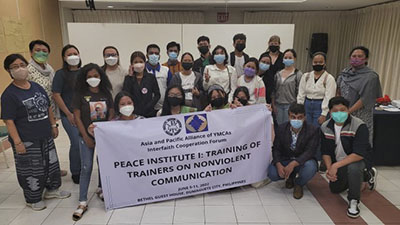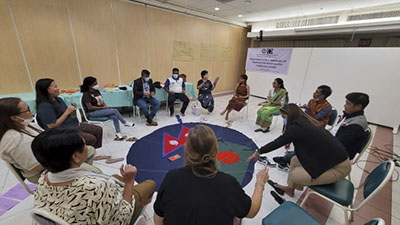ICF organized an in-person Training of Trainers on Nonviolent Communication
Last Updated (Tuesday, 28 June 2022 15:47)
On June 6-10, 2022, the Interfaith Cooperation Forum organized a five-day in-person Training of Trainers on Nonviolent communication. The activity took place at Bethel Guest House, Rizal Boulevard, Dumaguete City, Philippines. Nine participants attended the Training of Trainers. 4 were males and 5 were females from four Asian countries, such as Bangladesh, Philippines, Timor-Leste, and Nepal. In terms of religious representation, 5 of them were Christians, 1 was a Hindu, and 3 were Muslims. The participants of the in-person Training of Trainer’s practicum were those who have complied with the requirements of the on-line sessions held on March 7-30, 2022 with satisfactory rating.
Through hosting Training of Trainers on Nonviolent Communication (NVC), the ICF expect those who received the certificates to contribute as facilitators in as in activities in their local or national contexts and in some ICF activities in the future. ICF reached out to a diverse group of young people who wanted to contribute in promoting peace through learning and practicing the nonviolent communication. The whole in-person Training of Trainers was designed to be divided into two important parts. The first part was a review of the principles of NVC. The second part was the practicum.
 |  |
The first part included the Elements/Components and Principles of Nonviolent Communication, Exercises on Empathy, Options in receiving hard-to-hear messages and The 13 NVC Dance Steps. The Training of Trainers started with greetings from the staff of ICF. Dr. Muriel Orevillo-Montenegro introduced the goals and purpose of the TO, and oriented the participants on the program flow of the training. The rest of the first two days had the resource persons, Amina T. Mambuay and Lara Mambuay, giving review inputs on the basic elements, principles, and other aspects of NVC. The new part of NVC that participants learned, as these could not be done online, were the exercises on Four Chairs – of giving empathey to others, and the Four Ears – of receiving hard to hear messages.
The third day was a day out with neature. The participants went to visit the ApoIsland where they swam with the giant sea turtles. In addition to enjoying the natural beauty, the main purpose of the trip was to keep the participants physically and mentally fit/healthy for the final practicum learning session based on their topics related to nonviolent communication.
The second part of the practicum session. 10 guest participants invited from a local community of Sibulan to the Training venue. It was an intergenerational group of Junior and senior school including some elder persons.
During the fourth and fifth day, the participant-facilitators did their practicum session based on the chosen aspects of Nonviolent Communication. Each facilitator prepared their module in terms of the topics on nonviolent communication. The practicum session conducted by the facilitators were: Session 1: Introduction to Nonviolent communication, What is NVC? The story of the Emergence of NVC (Denver Talha, Philippines), Session 2: The NVC model, Frame of engaging and modes of connection and purpose of NVC (Rajon Bhandari,Nepal), Session 3: The principle of NVC (Md Jiyaul Rahaman, Nepal), Session 4: The four key components of NVC : Observation, Feelings, Need and Request. (Psyche Mankhin, Bangladesh), Session 5: Empathy- the flow of connection extended towards the self or another person (Rinku Mankhin, Bangladesh), Session 6: NVC language: Jackal in, Jackal out, Girrafe in and Girrafe out (Edelene Rosin, Philippines), Session 7: The 13 NVC Dance Step (Leonia Freitas, Timor-leste and Seah Olimpain, Philippines), and Session 8: Workshop on Empathy: The four chairs- giving empathy to others and The four Ears – hard to hear the message (Sarah Adrianne Mambuay, Philippines).
At the end of each practicum day, at the end of the practicum session, the Resource persons, the ICF staff, and the participants provided their valuable feedback, comments, and guidance to each facilitator. The guest participants responded very actively and positively during the facilitation that was effective in making the facilitation session successful.
On the last night, the participants sat down to evaluate the entire ToT process using metacards. The areas evaluated were the content, accommodation, meal arrangement, ICF staff, resource persons, and the participations. They used seven different colors card to put their valuable feedbacks.
For the closing rites, the participants placed their national flags in the center. Then everyone sat down around it and shared their feelings, what they like or dislikes, what they have learned from this ToT, their commitment, and how they could contribute to promoting peace in their local communities when they return to their own communities.
 |  |
By: Rinku Mankhin
ICF School of peace 2019 Alumnus





